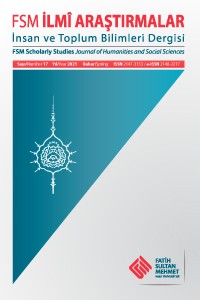Öz
Bu çalışmanın hedefi etkileşimli ve katılımcı bir medya türü olan yeni medyanın politik/
ideolojik söylem üretiminde en etkili mecralarından biri olan Twitter’ın yapısını ve
kullanıcılarının varoluşsal konumu mekân ve kimlik olguları üzerinden çözümlemektir.
Modern yaşamın ontolojik anlamda doğal, teknik anlamda yapay bir uzantısı olan, bir bireyselleşme/
toplumsallaşma pratiği olarak sosyal medyanın modern birey üzerindeki varoluşsal
boyuttaki etkisi; bireysel ve toplumsal yaşantıdaki duyuş, düşünüş, algılayış ve
davranış kalıplarını dönüştürmesi; son olarak tarihteki örneklerinden çok farklı bir insan
ve uygarlık türünün oluşumundaki inkâr edilemez rolünün arka planındaki paradigmatik
değişim irdelenmektedir. Bu hedeflere ulaşmak amacıyla öncelikle (I) sosyal medyanın
modern çağ ve paradigma içindeki yeri ortaya koyulduktan sonra (II) mekân ve kimlik
açısından benzeşim kurulan kavramların (fantazmagori, simülasyon ve flâneur) literal ve
kuramsal kullanım biçimleri, tanımları, anlam alanları ve Twitter pratiği ile benzerlikleri
ilişkilendirilmektedir. Daha sonra (III) Twitter’ın teknik yapısı mevzu bağlamında ele
alınmakta, son kısımda ise (IV) dijital bir mekânda inşa edilen dijital kimliklerin oluşturduğu
dilin (söylemin) bazı politik/ideolojik/parodik yönleri tespit edilmekte ve fenomen/
flâneur tipi semiyotik açıdan değerlendirilmektedir.
Anahtar Kelimeler
Kaynakça
- Aydoğan, Filiz (ed.), Yeni Medya Kuramları, Derin Yayınları, 2017.
- Baudrillard, Jean, Simülakrlar ve Simülasyon, İstanbul, Doğu Batı Yayınları, 2003.
- Benjamin, Walter, Pasajlar, İstanbul, Yapı Kredi Yayınları, 1993.
Öz
This article aims to structurally analyze Twitter as an interactive, participatory media
type that is one of the most effective channels of new media in political/ideological discourse-
production, as well as the existential position and situation of its users, through the
phenomena of space and identity. Given social media as a practice of individualization/
socialization is an ontologically natural, technically artificial extension of modern life,
the article explores its existential effects upon the modern individual; its transformation
of the emotional, reflexive, perceptive and behavioral patterns in individual and social
life; finally the paradigmatic change behind its undeniable role in the formation of a particular
type of human being and civilization that are very different from their precedents
in history. To do this, primarily (I) the place of social media within the modern age and
paradigm will be elaborated, then (II) literal and theoretical uses, definitions, areas of
meaning and similarities with the practice of Twitter of concepts (phantasmagory, flâneur
and simulation) that are likened to each other in terms of space and identity are examined.
The following section (III) contextually introduces the technical structure of Twitter and
the final section (IV) detects certain political/ideological/parodical aspects of the language
(discourse) constituted by digital identities in a digital space and reassesses the
phenomenon/flâneur type semiotically.
Anahtar Kelimeler
Phantasmagoria simulation flâneur Twitter language identity discourse
Kaynakça
- Aydoğan, Filiz (ed.), Yeni Medya Kuramları, Derin Yayınları, 2017.
- Baudrillard, Jean, Simülakrlar ve Simülasyon, İstanbul, Doğu Batı Yayınları, 2003.
- Benjamin, Walter, Pasajlar, İstanbul, Yapı Kredi Yayınları, 1993.
Ayrıntılar
| Birincil Dil | Türkçe |
|---|---|
| Bölüm | Araştırmalar ve İncelemeler |
| Yazarlar | |
| Yayımlanma Tarihi | 24 Haziran 2021 |
| Kabul Tarihi | 4 Mayıs 2021 |
| Yayımlandığı Sayı | Yıl 2021 Sayı: 17 |


